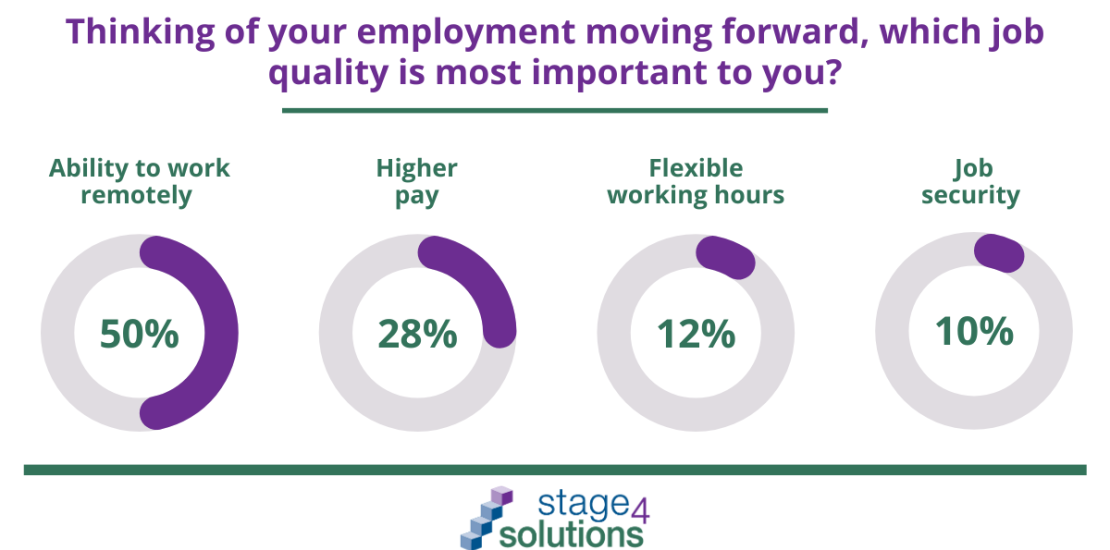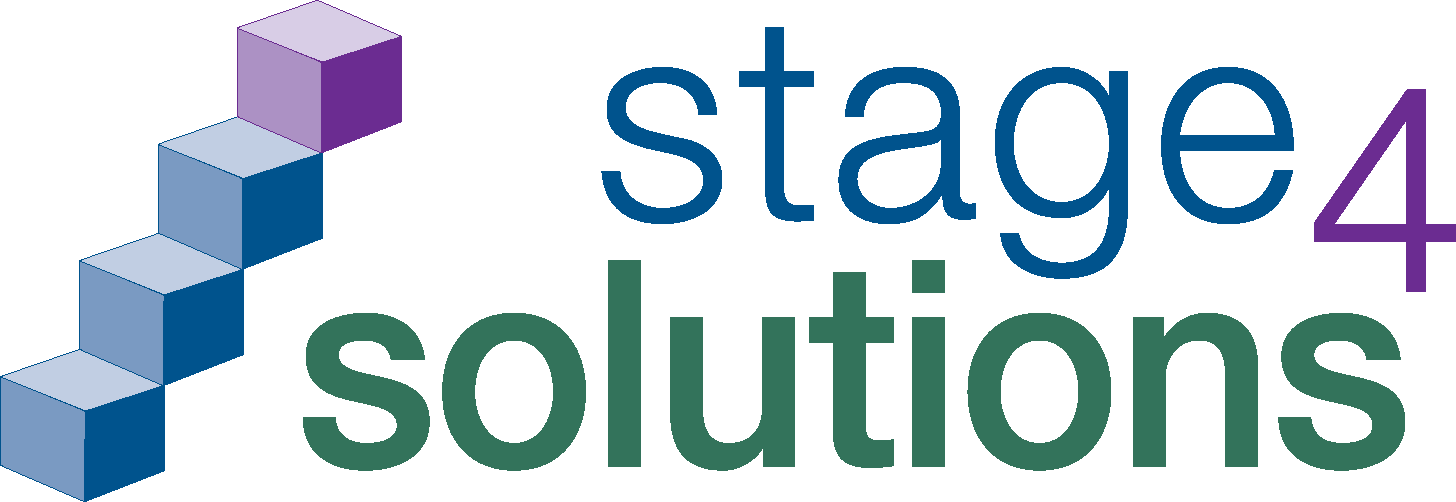The Most Important Job Characteristics for Professionals in Today’s Job Market
- April 24, 2023
- Posted by: Stage 4 Solutions
- Category: Blog

At the beginning of 2023, Monster’s survey found that 96% of workers were planning on finding a new position in 2023 and 66% of workers thought it would be difficult to make a shift due to the state of the economy. A recent report released in March 2023 stated that the percentage of workers looking for new roles has declined to 56%, however, over 79% of workers are looking to change an aspect of their job in 2023 and beyond with the majority requiring a raise at work, flexible hours or remote work. The priorities of the workforce have continued to shift over the past few years. We wanted to have a better understanding of the most important job characteristics for professionals in today’s job market and polled our community for their insights.
Whether you are actively looking for a new role or thinking about changing an aspect of your current job, which job quality is most important to you?
- Ability to work remotely 50%
- Higher pay 28%
- Flexible working hours 12%
- Job security 10%
Our poll results revealed that a majority of respondents (50%) value the ability to work remotely more than any other factor. These results show that job seekers are increasingly looking for careers that offer greater flexibility and autonomy over their work environment. Despite the news about companies requiring employees to return to offices and the declining number of remote job openings, the desire for remote working continues to grow. This disconnect between the preferences of the workforce and employer expectations may pose a challenge for businesses looking to attract and retain top talent in the changing labor market.
Studies have shown that remote work can significantly improve employee productivity and job satisfaction. In fact, a study by Stanford University found that remote workers experienced a 13% improvement in performance, attributed to fewer interruptions and distractions than employees working in a traditional office setting. Moreover, remote work has been linked to reduced stress levels, improved work-life balance, and increased employee retention rates. Despite these benefits, many companies remain hesitant to continue to embrace remote work, citing concerns over communication barriers, lack of team cohesion, and decreased productivity. However, many of these concerns can be addressed through the proper use of technology and effective communication strategies. With the rise of collaboration tools and video conferencing platforms, it’s easier than ever for remote workers to stay connected and maintain a sense of community with their colleagues. Employers can also leverage the advantages of remote work, such as reduced overheads and wider talent pools, to boost their bottom line and remain competitive. Overall, it is important to recognize that the ability to work remotely is not just a perk, but a demand for many job seekers.
Although the ability to work remotely emerged as the top priority for over half of respondents, it is important to note that the desire for higher pay cannot be overlooked, with 28% of respondents rating it as their most important factor. This emphasis on higher pay is unsurprising given the current economic climate, where inflation has eroded the value of wages globally. Inflation not only affects the purchasing power of employees’ income but also contributes to higher living costs, making it essential for job seekers to prioritize higher wages. Additionally, studies confirm that wages play a significant role in job satisfaction and employee retention rates. A report by Glassdoor found that 35% of employees would consider leaving their company if their salary did not increase in the next year. The report also revealed that employees who received a pay raise reported higher job satisfaction levels and were more likely to stay with their employer. In addition to offering competitive salaries, companies can also explore other forms of compensation to remain competitive, such as performance-based bonuses or stock options, to incentivize employees and boost job satisfaction.
Interestingly, in the same poll, only 12% of respondents rated flexible working hours as the most important job quality. This may seem surprising given the emphasis placed on work-life balance in today’s job market. However, it is important to note that some jobs simply cannot offer flexible schedules due to the nature of the work. Moreover, for some individuals, a set schedule with fixed working hours may provide a sense of structure and routine that they value in their day-to-day lives. For those who do place a higher priority on flexible scheduling, the benefits can be significant. Shifts in attitudes towards work and lifestyle have led to an increase in requests for flexible hours, including compressed workweeks, job sharing, and even the opportunity to set one’s own hours. These kinds of work arrangements can provide employees with more control over their lives, reduced stress levels, and greater job satisfaction. Moreover, flexible schedules can benefit companies as well, as they have been linked to decreased absenteeism, higher productivity, and reduced staff turnover. Society for Human Resource Management’s report has also shown that offering flexibility in the workplace can result in reduced overheads, such as rent and utilities, as fewer employees need to be physically present in the workplace.
Despite the current economic climate and the widespread layoffs and uncertainty that have accompanied it, only 10% of respondents in a recent poll cited job security as their top priority in a job. This is a surprisingly low number, given the anxiety and fear many workers feel about losing their jobs. One possible explanation for this result is that job seekers understand that job security lies with their own skills and network, not on a company’s performance. Really, there are very few “permanent” jobs. Employers can try to address this view by offering clear communication about the financial health and the future of the company.
It is worth noting that none of these job qualities can exist independently, and they are all interconnected. For example, the ability to work remotely goes hand in hand with flexible hours, as remote workers need greater control over their schedules to ensure they work effectively. While earning a good salary is important, it is clear that many workers are willing to sacrifice some financial reward in exchange for greater autonomy and control over their work and personal lives. Offering flexible work arrangements, remote work options, and transparent communication about job security can help to create a more motivated and committed workforce, leading to greater productivity and success for the company. By prioritizing the needs and desires of their employees, companies can create a workplace culture that supports both the business and the individuals who make it successful. We hope our insights are valuable to companies who wish to attract and retain top talent.

